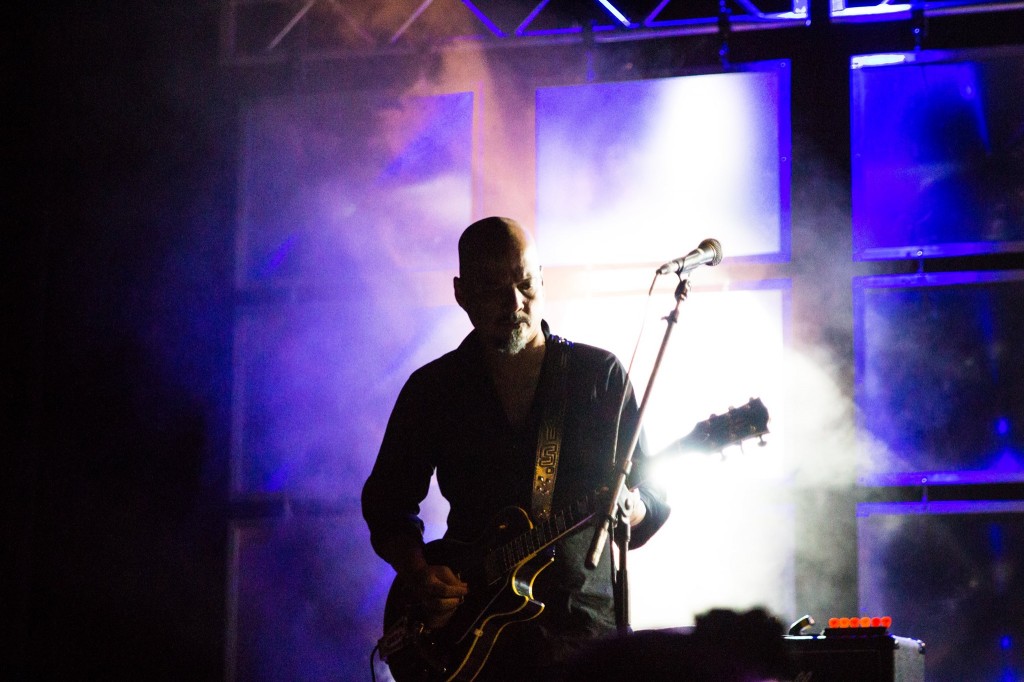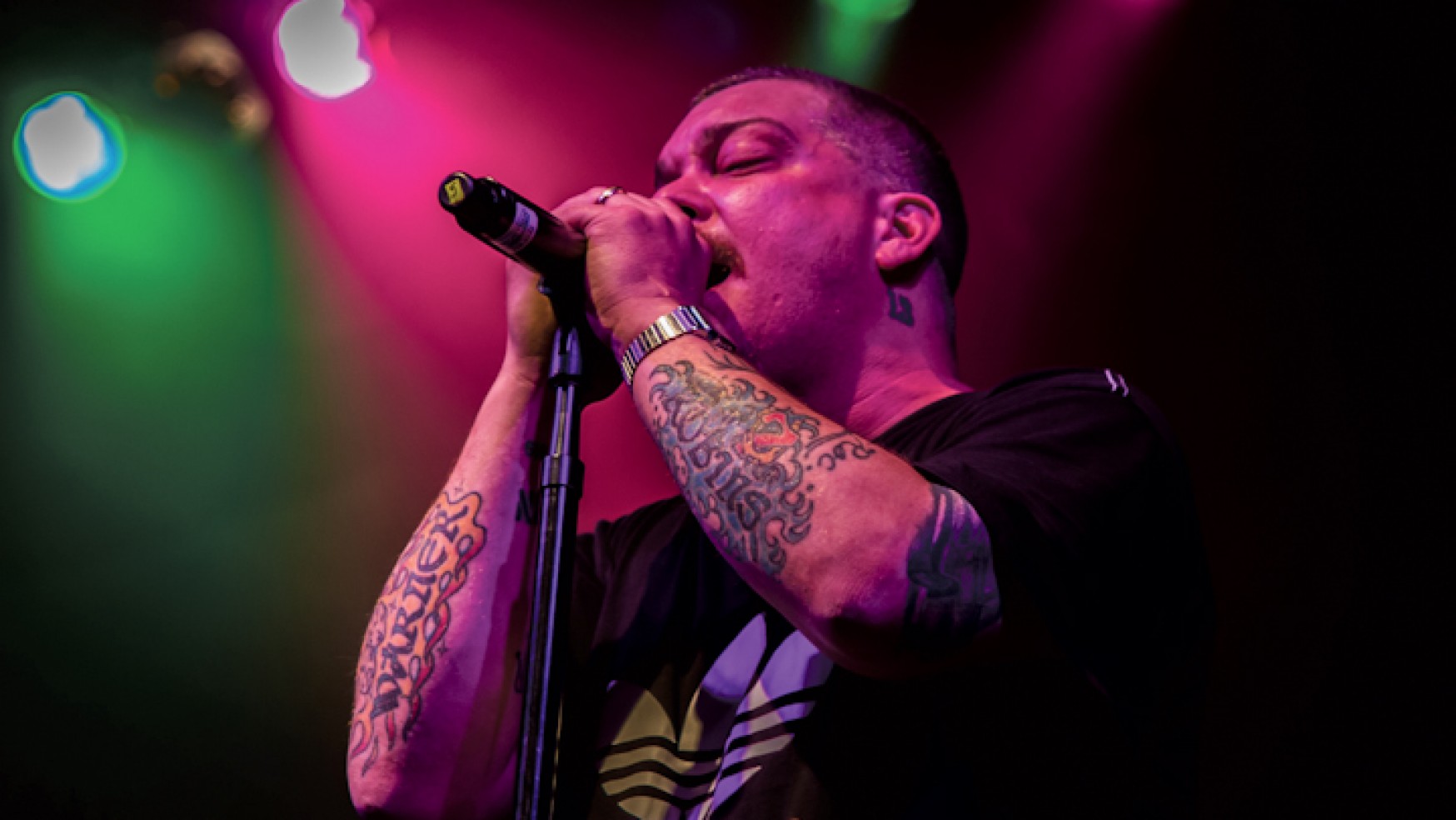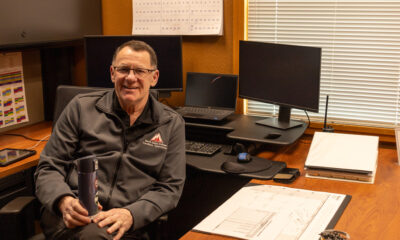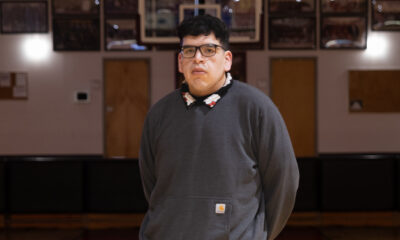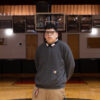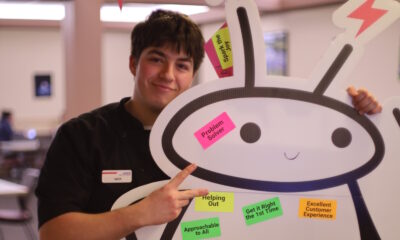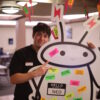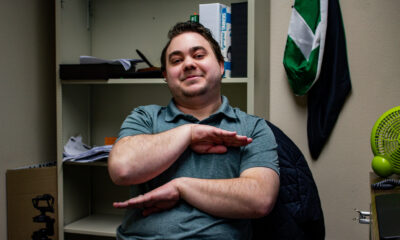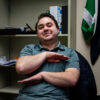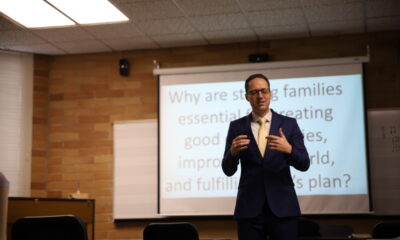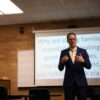Features
Rock Me, Joe: An Interview with Pixies Guitarist Joey Santiago
Sentinel super-fan scores exclusive interview with musical inspiration, Pixies guitarist.
Sitting in a thick layer of dust on an unkempt desktop was an old, off-white, beaten landline telephone on speakerphone. Duct tape held its battery in place. A calm, collected, Filipino-tinged baritone voice sprung from it; a slightly tired singsong; “Helllooo?”
Within any of the nearby trailers could have been a variety of important phone calls, but none of their participants likely lent consideration that just across the way fled the voice of one of noisy guitar-playing’s more well-regarded figures. Hello, is this Joey? “Yes, yes it is,” said Pixies lead guitarist Joey Santiago.
It’s an odd place for his voice to be. The disconnect between his mellow cool voice, legacy in rock history, and the bruised speakerphone he talked through are almost classically discordant, almost as such was the dynamics he was known best for in the band.
How are things looking over there? “Good. It’s sunny, I’m in L.A., We just got out of practice yesterday. You know, we’re practicing for the next leg of the tour.” Yeah, that’s starting pretty soon; that’s starting tomorrow or the day after? “It—it—oh, god, yeah, it is tomorrow. Yeah. Starts in San Diego,” he said with lighthearted exasperation.
Journalists have long described Santiago as the quietest member of the band. This seems less due to introversion than just because he was able to nutshell and summarize things well. This could suggest a similarity to his guitar styling; it isn’t about how many notes or chords are traversed, it’s about creating a tone accurately—the less complicated, perhaps the better. Santiago has been living in L.A. and has two children. He has recently finished up the first leg of the Pixies’ North American tour.
Aren’t you glad you didn’t get that economics degree? Joey laughed, recalling the degree he gave up in pursuit of a rock career. “Yeah! I didn’t want that, that would’ve been a total waste of money.”
So what was it that put you off that degree? “What do you mean? I liked it, you know, I mean I had a propensity for some reason to be good at it. I was probably more interested in the macro, you know?” I tell the story of a friend of mine who pursued the same degree for two years only to change it out of boredom. “Yeah, I imagine the career choices would have sucked. For me, anyways.”
So when you decided not to do that and joined the Pixies, what sort of conceptual differentiation did you define yourselves by that sort of separated you from everything else in music (U2, Beastie Boys, Depeche Mode, Van Halen, Boston)? “Well, you know, we didn’t plan on being different at all. We just thought a lot of music was maybe cluttered, there was a lot of heavy metal bands back then and we couldn’t play like that. We wanted a more quirky band, I guess. When Charles and I met in U-Mass, we both wanted to start a band. That was one my things about going to college, was to start a band.”
To that end, college worked out quite well for Santiago. The band has gone on to have two albums certified gold, influence big-name bands from Weezer to Radiohead, and receive critical accolades as significant as having their album “Doolittle” appearing in Rolling Stone’s top 500 albums and being ranked the second best album of all time by NME readers. It’s hard to imagine this happening without the dominant stylistic addition of Santiago: unpredictable angular riffs and shards of noise that will cut through the bubble-gum dynamism often found in the band’s rhythm section, and ethereal soundscapes that linger in the background like something from a horror film. It’s hard to believe that nothing drove this unique style.
During the Pixies’ career have you met any rock heroes that inspired you to get involved in rock? “We met David Bowie and U2. People like that, you know, people who we played for. David Bowie actually wanted to meet us in L.A. at this club before we even played with him. He is a big fan of ours. I thought that was weird, you know, the tour manager goes, ‘Oh, someone wants to meet you.’ I went, ‘Who?’ He says, ‘David Bowie.’ ‘Pffhwwah? Yeah, come on over!’”
Through all the touring have you met any bands along the way that you think will be making the history books the way the Pixies have? “Oh, god, you know, there’s a lot of factors involved. I met Arcade Fire at The Lobby in Detroit when they were just crackin’ it and I never knew who they were at that time, so they handed me a CD and I go; ‘This is fantastic!’ I thought they were still in the infant stage, and they were like wondering, ‘What the hell is this CD like?’ And I happened to put it on, and it was really good. There was this other one—you know what, I can’t remember! There’s so many bands that open up for—god d*** it—I wish I knew one of them, but they were skateboarders and they were really, really good.” Later Santiago recalled the band’s name was FIDLAR. “And I like Gogol Bordello who’s gonna open up for us, Cat Power too. She’s opening up for us, too. It’s a great lineup.”
The Pixies are of an odd breed wherein they have become much more popular after the dissolving of their band than when they were actually recording in the studio. Their most impactful albums were made in the late ‘80s and their influence wasn’t known until the grunge movement was in full swing. On September 23, 1991, the day before Nirvana’s “Nevermind” hit record stores, “Trompe Le Monde” was released by the Pixies, marking the beginning of a hiatus from music (particularly album-making) until just this year with the release of “Indie Cindy,” their highest peak on the Billboard 200 yet at #23.
They’ve been touring to promote the album with bassist Paz Lenchantin after years of tension between Pixies front man Black Francis (Charles Thompson) and founding bassist Kim Deal.
“[Touring is] just more invigorating and I think that’s due to us just appreciating it, and also having Paz onboard is making a big, huge difference for us.”
In a previous interview you said Paz had both yours and Charles’ vote as a new bassist, and David seems to be a fan, and you said there’d be more news on that later. Is there any development there? “No, not yet, she recorded one song with us, a B-side, “Women of War.” And we like the presence in the studio.
How does she feel about it? “Well, she loves it. She did love the band beforehand, and she’s got the same personality as us, so it’s good. It’s good.”
What sort of personality is that? “She’s just funny and very smart, and she’s just very easy-going.” Santiago emphasized the very easy-going.
Having composed for television and working with The Martinis, do you feel as if that work you’ve done independently of the Pixies has been outshined? “Of course, I can’t beat being in the Pixies. You know, all of us can’t. I got those gigs partly because they definitely need a hand, but at the same time you have to really work at the craft, and after a while they didn’t give a s— who you were. They just want the movie done, or the TV episodes done, you just have to be professional in the end of it. It’s crazy. And what I learned from that is that nothing’s ever that precious. And you just gotta work fast, and I learned more to be atmospheric—and that’s what I am anyways. But even so, that just made it easier for me to record ‘Indie Cindy.’ Well, it’s not any easier, but I put a lot of pressure on myself.” The phone-line went on the fritz at this point. “I learned how to embrace myself. I’m always trying to grow but, you know, f— it. This is what I sound like. I can’t help it.”
Do you prefer that studio-for-TV, have to get it done by a deadline, over touring? “Nothing beats being in the Pixies. Nothing. So, that’s what I like doing more than anything else.”
It’s kind of interesting that you do scoring because it’s not that far off from work with the Pixies to an extent. Like, even Gil [Norton, ‘Indie Cindy’ producer] advised to look at this album cinematically, and you guys are pretty big on film, like with the surrealism influences. “Yeah.” How do you feel about ‘Where Is My Mind?’ being used in ‘Fight Club’? “Oh, of course! Of course! It’s great. If anything, that’s why people love the song. That’s how a lot of new fans have been introduced to us, and I think it was a perfect placement for the song, it was just right on.”
Are you guys working on any new material right now? “No, not at all, not at all. There’s no time! We got a three-week break in-between, it’s just not enough time to get anything going and when we’re on tour we’re just on tour, we’re not able to really hash things out, we don’t do sound check. And that’s probably where bands work out a song—I suppose you could do it on the bus, but when you’re on the bus you just want to take a nap.”
What sort of things do you do when you’re not playing or sleeping on tour? “I try to see the city. I’ve got this rule that I have to walk at least one hour or something. I just like to walk around a city, get my exercise in and soak in the sights and all that. I’ll just go to a café and do normal stuff, record shop. I do laundry on the road.”
Well that’s cool—you get to see all the kinds of different laundry and record shops. Santiago chuckles, “yeah, exactly.”
I was wondering, outside of the Pixies, is there any particular work you favor? “Work… well, you know, I like raising my kids. That’s really the priority. When you’re on tour, you wonder what they’re doing, all that stuff, and you gotta raise ‘em and get rid of their bad habits and embrace the good ones. And that’s basically what you do.”
Have you shown them any of your work? “Yeah, you know, I’m just a dad to them. They don’t want to know what I do. They want to get fed, go swimming: they wanna play, play catch, they don’t give a crap that I’m in a band. They miss me when I’m gone and they say, ‘Why can’t you do a shorter tour, blah blah blah?’ But they understand that’s what keeps the light on.”
Transitioning to one of the more frequently asked questions probably, ‘Indie Cindy’ has some mixed reviews, possibly more so than any of your previous albums. What would you say to critics who would say the Pixies aren’t whole because Kim’s not there? “Well I mean, come one, it’s not really the music you’re talking about anymore. You know, so… you gotta ignore that. Having said that, we ignore every single review. I don’t read them, actually. These days you just wanna get a lot of Internet hits and get as much attention as you can, you know, and I mean, you’ve got a right not to like it. I don’t like a lot of records that other people like; it’s just the nature of being a music fan. So, hey man, the guy didn’t like it, so you could review him.”
You said there’s some records you don’t like; are there any particular genres that appall you or you keep away from? “Nah, not really. I listen to everything. Anything that my kids like, I like, just because they like the music. They like to listen to it. It’s very different when you’re a dad because your kids open you up. You know, I took my daughter to a Katy Perry show. I liked that, you know. She’s a good performer, she sings, she writes her own stuff, you know, she empowers the audience, and when she spoke to you it felt very intimate. That thing that my daughter got out of that is that you can achieve anything. So that’s good, overall that was it. That was the main thing that she said after. It was a good, positive experience.”
With that stage presence, as a performer, speaking about Katy Perry, how do you feel about your self when you’re on stage? “Eh, you know, I am what I am. People like you. I’m not that animated, and I don’t wanna be fake about it. So, that’s the way I am, it just comes across. And I’m starting to come out of my shell. I saw Weezer, Rivers [Cuomo, Weezer frontman]—he kept to himself, but then when things get going he becomes this performer guy, it was like, ‘ra, ra, ra,’ it was like: OK. Anybody can do it. People do expect you to do that. Not expect, but they wouldn’t be so surprised when you do. I gotta do that. You know, I played with Link Wray one time, and he made me monitor surf. I just went, ‘Come on?!’ [Santiago sounded embarrassed, annoyed and bewildered just recalling the moment.] And I put my feet on the monitors and I go; ‘Oh my god…’ And people loved it when we did that, both of us surfing on monitors. It was great. I just played one song with him, I was the guest thing.”
Is that someone who was a personal influence? I just imagine he would be a pretty big influence to you. “All that surf stuff, it was a big influence. Once again it’s like scoring a movie, with one word. You know; ‘bonzaaaaiiiii,’ ‘rummmmbbbbblllllleeee.’ Here the phone went on the fritz again. “It’s the same thing I do with the Pixies, I do one word and I go with it. It’s like, you know, that song, ‘Dead!’ You know, that song ‘Dead?’ That was me doing ‘Psycho,’ you know: ‘EEEK, eeek, EEEEK, eeeek, EEEEEK, eeek,’ except Psycho only kept on one note and it sounded really creepy. They said, ‘Dead,’ so I said, ‘OK, I’ll go ‘Psycho.’’”
So, with this tour I’ll be seeing you on the third in Spokane, I believe it’s your third show—are you as bothered as I am that the show’s gonna be seated? “Is it seated?!” Yeah, it’s a seated show. “Eh, you know, people will end up standing up. There’s some places, we call them soft-seaters. We get a bunch of ‘em, Fox Theaters, they’re just beautiful. They’re very ornate. We did a tour just playing all these venues, beautiful venues, and people want to see us there. They want to be in a classy place. And I end up just looking at the ceiling and enjoying the architecture, all of that stuff. We gotta change it up, you know? It’s not like the band is playing a basketball arena, you know? We did that one time, and I said, ‘If I gotta see another basketball hoop I’m gonna go f—— crazy,’ you know it doesn’t really sound that great, it’s for sports. So we’re just sort of clanging around and I hate playing those kinds of places.”
Alright, it’s looking like we’re running out of time; is there anything you’d like to add? “No, I haven’t had my morning coffee so I can’t really add anything right now,” he said with light humor.
T.J. Gossard is The Sentinel student newspaper's Features assistant editor, and is also the president of NIC Film Club and NIC's Phi Theta Kappa Delta Kappa Chapter. Gossard intends to become a film director and is currently practicing skills of communication and multitasking by taking on club duties and pursuing an A.A. in Communications at North Idaho College.


